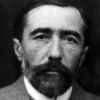Joseph Conrad

Joseph Conrad
Joseph Conradwas a Polish-British writer regarded as one of the greatest novelists to write in the English language. He joined the British merchant marine in 1878, and was granted British nationality in 1886. Though he did not speak English fluently until he was in his twenties, he was a master prose stylist who brought a non-English sensibility into English literature. He wrote stories and novels, many with a nautical setting, that depict trials of the human spirit in the midst...
NationalityPolish
ProfessionNovelist
Date of Birth3 December 1857
CountryPoland
I remember my youth and the feeling that will never come back any more
[The artist] speaks to our capacity for delight and wonder, to the sense of mystery surrounding our lives; to our sense of pity, and beauty, and pain; to the latent feeling of fellowship with all creation--and to the subtle but invincible conviction of solidarity in dreams, in joy, in sorrow, in aspirations, in illusions, in hope, in fear…which binds together all humanity--the dead to the living and the living to the unborn.
All creative art is magic , is evocation of the unseen in forms persuasive, enlightening, familiar and surprising, for the edification of mankind , pinned down by the conditions of its existence to the earnest consideration of the most insignificant tides of reality .
Resignation, not mystic, not detached, but resignation open-eyed, conscious, and informed by love, is the only one of our feelings for which it is impossible to become a sham.
For the great mass of mankind the only saving grace that is needed is steady fidelity to what is nearest to hand and heart in the short moment of each human effort.
The air of the New World seems favorable to the art of declamation.
To have his path made clear for him is the aspiration of every human being in our beclouded and tempestuous existence.
The world of finance is a mysterious world in which, incredible as the fact may appear, evaporation precedes liquidation.
The humblest craft that floats makes its appeal to a seaman by the faithfulness of her life.
Nations it may be have fashioned their Governments, but the Governments have paid them back in the same coin.
Protection is the first necessity of opulence and luxury.
One wonders that there can be found a man courageous enough to occupy the post. It is a matter of meditation. Having given it a few minutes I come to the conclusion in the serenity of my heart and the peace of my conscience that he must be either an extreme megalomaniac or an utterly unconscious being.
A man that is born falls into a dream like a man who falls into the sea.
There is a subtle and unmistakable touch of love and pride, beyond mere skill, almost an inspiration which gives to all work that finish which is almost art - which is art.